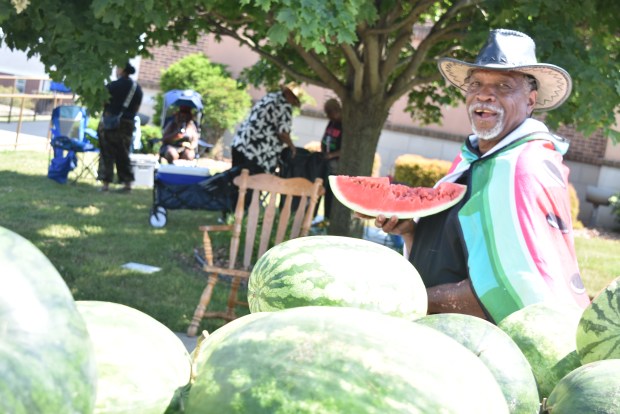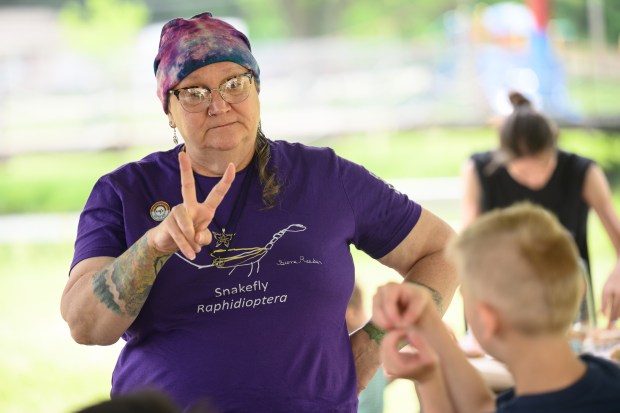When Evanston’s 3rd Ward City Council Member Melissa Wynne was persuaded to run for office by neighbors she didn’t think she’d win. But she did.
After 28 years in office she’s decided not to run for reelection to spend more time with family and friends and travel.
Travel is nothing new to Wynne. Her father was a career Naval officer and Wynne was born on a naval base in New Jersey. She lived up and down the East Coast but went to high school in Bangkok, Thailand and also lived for a time in Hawaii. Wynne graduated with a law degree from Northwestern University in 1987 and practiced for five years as an environmental lawyer for a Chicago firm. In 1988, she moved with her husband to Evanston because they wanted to be close to the lake.
Evanston Mayor Daniel Biss said Wynne will be leaving a remarkable legacy of public service, which he said is clearly visible from the thriving 3rd Ward.
“She has been a resolute voice for calm, collaborative, careful decision-making, in a time when that deliberate approach is too rare and sorely needed,” Biss said. “I know that I will miss her participation in Council, and I expect that the whole community will as well.”
Wynne and her husband have lived in the same home in the 3rd Ward since moving to Evanston where they raised two children, Matthew and Caroline, who are now adults. Wynne said she was proud to raise her family in Evanston and agreed to do a Question and Answer interview with the Evanston Review reflecting on her time on City Council.
Why did you decided to run for the city council?
At the time we had a neighborhood issue that had come up and there were a number of us in the community who were disappointed in the representation we had on the council. I got drafted to run and, at the time, did not really expect to win but just wanted to have a good race in which the important issues to the community were raised.
What have you learned in your 28 years in city government?
It’s so much. I’ve learned a LOT about all the different policy issues. More than anything I think it’s just how satisfying public service is. Everything from working on very complex policy problems like affordable housing to helping a resident navigate the complexities of city government to solving relatively minor problems. It’s all very satisfying. The other thing I’ve learned is what a real wealth of intelligence, common sense and thoughtfulness we have in the residents of Evanston.
You’re leaving the council but remain a dedicated Evanston resident. What changes to you see coming to the city in the next 10 – 20 years?
We’re in the middle of rewriting our comprehensive general plan and then our zoning ordinance. I think there will be changes in the zoning ordinance that will change Evanston in the next 10 or 20 years. I think we’ll grow and become somewhat more dense in smart ways. I think our transportation will become less car dominant and that people (will) use public transportation more. I think we’ll see a lot more people on bicycles. I think our downtown will be thriving probably with more residential (buildings) and we’ll have figured out what the new normal is for our downtown economy post COVID.
What concerns you the most?
Our affordability. That we don’t become too expensive of a place for families to move to. That’s kind of happened to some extent and what we’re trying to do is make sure it’s still possible for a young family to buy a house in Evanston or people to come back to the community they grew up in. I do worry about climate change and the impact it will have on Evanston and the world.
What do you consider to be your biggest accomplishments on the city council?
It’s a whole series of things. One of my first votes on the council was for the movie theater complex, which really transformed our downtown. We altered the zoning on the length of Chicago Avenue, which really spurred the residential (options) we have along it which has really changed the corridor. The Main Dempster Mile business district is just thriving and has become the example that other business district want to be like. That’s really important. Having us be the first municipality in the United States that has an actual reparations program is very significant. Keeping the lakefront non-commercial and available to all is really important.
You voted against Northwestern University getting the zoning relief it was requesting for concessions in a new $800 million stadium. What drove your decision to vote against that?
I thought the plan was too burdensome to the community. I though the size and scale of the stadium was too large and I had hoped they would do a renovation rather than a total rebuild. I thought the concerts they were proposing would be overwhelming to the community.
Northwestern University’s relationship with Evanston has been difficult at times. How do you view that relationship and do you think the university should pay money to the city in lieu of taxes?
During the course of my time on council, our relationship has had some ups and downs. It’s actually in a more of a medium place now. We’ve had much rockier periods of time. I wish Northwestern would contribute more to the city of Evanston. I wish Northwestern would recognize that they really are a partner with us in the city of Evanston and we could come up with a longer term and smarter financial partnership.
Evanstonians are very protective of the lakefront. Over the years many plans for changes there have been proposed. How should future city councils look at this highly valued public space?
They should look at it as the jewel it is. Recognizing that keeping it non-commercial is what makes it so attractive and also keeping it non-programmed means people can come and read a book on one day and bring a ball on another day and have a soccer game. They can have a big family reunion or a quiet dinner on the lakefront. Having it remain undeveloped and open to all really allows everyone to use the lakefront as they want to use it and to leave it available for the next resident.
Evanston says it values diversity yet some say the city has what they call “drive by diversity,” where there’s only ethnic diversity in parts of the city. What’s your answer to them?
We’re growing more diverse as with the increase in the Hispanic population. Some of our residential neighborhoods are much more diverse than others. It’s something I hope will change over time.
U.S. Census data indicates Evanston had a net increase of 1,281 housing units between 2010 and 2020, to a total of 34,462. So 7,000 new units would represent roughly a 20% increase in the city’s housing stock. What’s your take on that?
I think that’s good. We probably need to grow more. We can continue to grow. We have the services available. But we don’t have more space to develop so what we have to think about doing is perhaps becoming moderately more dense. That does not mean a bunch of super high rises but moderately making some changes to our residential districts. Growth is positive. Growth is more taxpayers.
Online reports say Evanston’s housing costs are 45% higher than the national average. Additionally, because the suburb doesn’t have as many internal public transportation options as Chicago does, its transportation costs are also 29% higher than the national average. Can city government help to solve those issues? How?
Comparing us to a national average is comparing us to both the coasts as well. That statistic is not really helpful. It’s whether you can afford to live here or not on the salary you have. I think the city can help that in providing more opportunity for development. Smart development.
I’d like to get your thoughts on a quote from Verónica Michelle Bachelet Jeria, a Chilean politician who served as United Nations High Commissioner for Human Rights from 2018 to 2022. “As more and more women, men and young people raise their voices and become active in local government, and more local leaders take action for the safety of women and girls, change happens.”
I completely agree. When I first joined the council I was one of two women on the council. The reprehension of women on the council has only grown since then. We have long since had women mayors. I think the more women become involved in elective politics the more thoughtful and sane it becomes.
What are your plans moving forward?
To relax and spend more time with my family and friends. To travel.
What advice would you give the person who will become 3rd Ward council member?
Listen and talk with constituents and your colleagues and definitely recognize the talents and expertise we have on the city staff. We have a really fine city staff. I hope most Evanstonians recognize that. The talent we have in the Civic Center is really remarkable.
Brian L. Cox is a freelance reporter with Pioneer Press.




